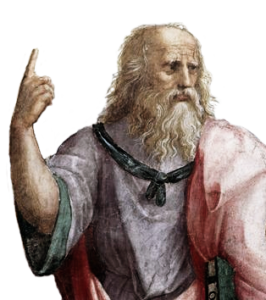Hegel über Platon 009

Parte de:
Lecciones de Historia de la Filosofía [Vorlesungen über die Geschichte der Philosophie] / Primera parte: La Filosofía Griega [Erster Teil: Griechische Philosophie] / Sección Primera: de Tales a Aristóteles [Erster Abschnitt. Von Thales bis Aristoteles] / Capítulo 3: Platón y Aristóteles [Drittes Kapitel: Platon und Aristoteles] / A. Platón [A. Philosophie des Platon]

Tabla de contenidos
Vorlesungen im Atrium Philosophicum §9
Indem ich zur Darstellung der Platonischen Philosophie übergehe, so ist zuerst von der ersten, unmittelbaren Weise, in welcher sie sich zeigt, zu sprechen. Es ist die Beschaffenheit der Platonischen Werke selbst, welche in ihrer Vielseitigkeit [20] uns verschiedene Gestalten des Philosophierens darbietet. Hätten wir noch das rein philosophische (dogmatische) Werk Platons, worüber Brandis geschrieben hat, das unter dem Titel Von der Philosophie oder Von den Ideen von Aristoteles zitiert wird und er vor sich gehabt zu haben scheint, wenn er die Platonische Philosophie beschreibt, von ihr spricht, so würden wir dann seine Philosophie in einfacherer Gestalt vor uns haben. So aber haben wir nur seine Dialoge, und diese Gestalt erschwert es uns, sogleich Vorstellung zu gewinnen, uns bestimmte Darstellung von seiner Philosophie zu machen. Die Form des Dialogs enthält sehr heterogene Elemente, Seiten was ich darunter verstehe, ist dies: daß darin eigentliches Philosophieren über das absolute Wesen und das Vorstellen von demselben mannigfaltig vermischt ist, macht diese Verschiedenseitigkeit aus.
Praelēctiōnēs in Ātriō Philosophicō §9
Mientras nos adentramos en la presentación de la filosofía de Platón, debemos reparar en la forma en que se nos presenta de manera inmediata. Esta es la la naturaleza misma de las obras platónicas que nos brinda también, con su multiformidad, diversas formas de filosofar, y es aquí, precisamente, donde radica la primera dificultad. con que tropieza la comprensión de la filosofía platónica. Si se hubiesen conservado los discursos verbales (ἄγραφα δόγματα) de Platón bajo el título de En torno a lo bueno (περὶ τἀγαθοῦ), recogidos por sus discípulos y que Aristóteles cita y parece haber tenido a la vista en su obra De la filosofía o De las ideas o Del bien (acerca de la que ha escrito Brandis), donde trata de la filosofía platónica, es posible que viéramos las concepciones filosóficas de Platón en una forma más sencilla, ya que en esta obra procedía nuestro pensador, al parecer, de un modo más sistemático.1Brandis, De perditis Aristotelis libris de ideis et de bono, sive philosophia, pp. 1-13. (Cfr. Michelet, Examen critique de l’ouvrage d’Aristote intitulé Métaphysique, 1835, pp. 28-78) [M.]. Pero es el caso que sólo han llegado a nosotros sus diálogos, y la forma de estas obras hace que nos sea difícil obtener en seguida una idea clara y concreta de su filosofía. La forma del diálogo contiene, en efecto, elementos muy heterogéneos, en los que aparecen mezclados de diversos modos un verdadero filosofar en torno a la esencia absoluta y la manera de representarse ésta; y es eso precisamente lo que da a las obras platónicas aquella multiplicidad de formas.
Perge ad initium paginae huius
Lectures at the Atrium Philosophicum §9
As I move on to the presentation of Platonic philosophy, I must first speak of the first, immediate way in which it presents itself. It is the nature of Plato’s works themselves, which in their diversity offers us various forms of philosophizing. If we also had the purely philosophical (dogmatic) work of Plato, about which Brandis wrote, which is quoted by Aristotle under the title Of Philosophy or Ideas and which he seems to have had in front of him when he described Platonic philosophy and spoke of it, then we would have his philosophy in a simpler form. But as it is, we only have his dialogues, and this form makes it difficult for us to immediately gain an idea, to give ourselves a definite presentation of his philosophy. The form of the dialogue contains very heterogeneous elements; what I understand by this is this: the fact that in it actual philosophizing about the absolute essence and the representation of it are mixed in many different ways, accounts for this diversity.
